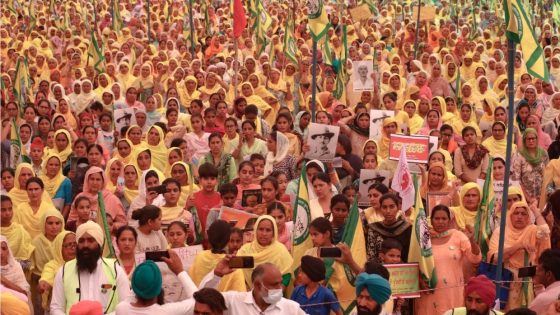Eminent Indian documentarian Nishtha Jain’s latest effort is an account of the epic, year-long farmers’ protest that took place in India in 2020-21.
“Farming the Revolution,” which world premieres at Hot Docs, follows the millions of Indian farmers who gathered during the height of COVID-19 lockdown at the borders of the country’s capital, Delhi, to protest against newly enacted farm laws. The farmers believed that if implemented, these laws would negatively impact the government-protected farmers’ markets, leaving them to the vagaries of the free market.
Jain is known for jute weaving documentary “The Golden Thread,” which won the top prize at Bergamo this year and multiple award-winning woman empowerment film “Gulabi Gang” (2012).
“It was the COVID year. We had already witnessed heart-rending scenes when the sudden announcement of all-India lockdown saw millions of Indian migrant workers walk to their homes thousands of miles away from the cities. A few months prior to that were the Delhi ‘riots’ which brought the India-wide protests against the citizen amendment bill to an end leading to the arrests of many human rights activists,” Jain told Variety.
“When spontaneous protests against the farm laws broke out all over India, the question foremost in my mind was, will the farmers rise to protest the farm bills and how would that pan out. If their movement was crushed like many before, it could mean that they would lose whatever little state protection they had and would gradually lose their farm lands, their sole source of livelihood. This would be catastrophic. We began filming two days after the farmers reached Delhi borders and were stopped from entering Delhi.”
However, Jain and her crew, which included co-director and DoP Akash Basumatari, persevered.
“The movement was massive. There were millions of people at one point, hundreds of farm unions, huge protest cities at the four to five entry points to Delhi. There was so much to unpack – from why the farmers are protesting, the challenges of farming in India, the nature of the present protests. Even though the farm unions were united, there were differences in their approach and politics. Plus many other organizations joined the farmers with their own agenda.
“What story do I tell and through whom? It took me a while but I decided to focus on the largest and oldest farm union from Punjab because of their approach to resistance, which was both novel and revolutionary while being completely non-violent. And then the movement went on for very long and it was difficult to get funding until it ended,” Jain said.
Funding eventually arrived from a variety of sources. The film is supported by Sundance Documentary Fund, IDFA Bertha Documentary Fund, Chicken & Egg Pictures, Alter Ciné Foundation, CNC, PROCIREP, ANGOA, Sørfond, Fritt Ord, NFI, NRK, RTS, Bergesenstiftelsen and Filmkraft Rogaland. The producers are Jain for Raintree Films and Valérie Montmartin for Little Big Story, with Torstein Grude serving as co-producer for Piraya Film, in co-production with ARTE France and Al Jazeera.
“The third and the most difficult part of it was editing 500 hours of rushes into a 100-minute film and translate the social-cultural-political context to the outside audience which knows very little about India, be it farming, Punjab’s history or Sikhism’s influence on the farmers protests,” Jain said. “To give you a small example, very few people outside India have heard of India’s freedom movement martyr Bhagat Singh. But in the protests, we saw thousands of Bhagat Singhs, every young farmer drew courage from their hero who was hanged by the British colonizers.”
Cinephil is handling international sales. “’Farming the Revolution’ is both a cinematic achievement and an urgent record of the farmers struggle in India which mirrors the difficulties of the agricultural fields across the globe. Nishtha and Akash were able to capture the resilience of people and to craft an ode to their power,” Cinephil managing director Suzanne Nodale told Variety.
While Cinephil will ensure that “Farming the Revolution” is seen globally, it is a rather more difficult task in India. “Even festival screenings in India require a go-ahead from the Information and Broadcasting Ministry. And getting a censor certificate for political documentaries is always tough and next to impossible. Public screenings of films even though they have a censor certificate have been known to be disrupted if the subject doesn’t suit the ruling government. Streamers too don’t touch political content in India. So the only way is releasing it for free on YouTube. And of course releasing it in international film festivals and TV channels abroad,” Jain said.
Jain is now taking a break from documentaries and collaborating on a narrative project with a scriptwriter.
Source Agencies


